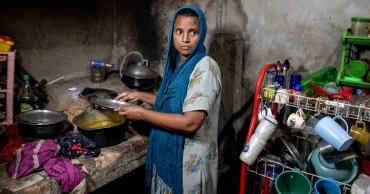developing countries
Sugar-sweetened beverage consumption is on the rise in developing countries: IFAD
Sugar-sweetened beverage consumption is on the rise in developing countries, according to a literature review released by the International Fund for Agricultural Development (IFAD) as part of its IFAD Research Series.
The global sales of total per capita volumes of packaged food – which are usually processed which in most cases increases the content of added or free sugars, saturated and trans-fat, salt and diet energy density, while decreasing protein, dietary fibre, and micronutrients – rose from 67.7kg per capita in 2005 to 76.9kg in 2017.
Steep price gaps between healthy and unhealthy foods, coupled with the unavailability of a variety of healthy foods, are driving rising obesity rates in both urban and rural areas of developing countries, IFAD said on Wednesday.
IFAD president urges new Global Financing Pact to prioritize small-scale farmers in poverty
“While price gaps between healthy and unhealthy foods exist in nations across the globe, that price gap is much wider in poorer countries. Also, high-income inequality within a country is associated with a higher prevalence of obesity,” said Joyce Njoro, IFAD lead technical specialist, nutrition.
“If we want to curb rising obesity rates in developing countries, we need big solutions that address how food systems work. It is alarming to note that three billion people globally cannot afford a healthy diet,” said Njoro.
Poorest countries show strong support for IFAD in global efforts to combat hunger and poverty
“Preventing obesity in developing countries requires a comprehensive approach that addresses cultural norms, raises awareness of associated health risks, and promotes the production, availability and affordability of healthy foods.”
The research conducted by IFAD, in collaboration with Wageningen Centre for Development Innovation (WCDI), reviewed hundreds of peer-reviewed studies and examined data from five representative countries—Indonesia, Zambia, Egypt, Nigeria, and Bolivia—to better understand the drivers of rising obesity rates in developing countries and what types of interventions work to address this global public health challenge from a food system perspective.
Obesity rates across developing countries are now approaching levels found in high-income countries. The analysis found a number of drivers of obesity in developing countries, including:
IFAD President lauds Bangladesh's remarkable achievements in food production, climate-smart agriculture
Food Prices: The price gap between healthy foods (expensive) and unhealthy foods (inexpensive) is greater in developing countries than in rich developed countries. As a result, three billion people cannot afford a healthy diet. According to one of the studies reviewed (Headey 2019), it is 11.66 times more expensive to obtain a calorie from eggs in poor countries than it is to obtain a calorie from starchy staples, while in those same countries it is only 2.92 times more expensive to obtain a calorie from sugary snacks than from starchy staples. In rich countries, there is a much smaller gap: it is 2.6 times more expensive to obtain a calorie from eggs than it is to obtain a calorie from starchy staples and 1.43 times more expensive to obtain a calorie from sugary snacks than from starchy staples.
Culture: In some developing countries, fatness of a child is desirable as it is considered as a sign of health and wealth, and consumption of unhealthy foods may also carry a certain prestige. Culture also plays a role at the energy expenditure side of the equation in cultures where physical inactivity is associated with high social status.
Gender: Women are more likely to be overweight or obese than men in nearly all developing countries. In a review that focused on lower middle-income countries (Nicole D. Ford et al. 2017) proposed multiple reasons for this sex disparity in overweight and obesity prevalence. Reasons included: different physiological responses to early-life nutrition, different hormonal responses to energy expenditure, weight gain associated with pregnancies, lower physical activity levels, depression, economic circumstances over the lifespan, and differences in sociocultural factors – like ideal body size and acceptability of physical activity.
The paper also examines interventions that have been deployed in developing countries to curb obesity rates, including food packaging, labelling and advertisements, taxation and import duties on certain foods, and evaluates their respective effectiveness.
2 years ago
Climate Change: Momen urges global community for more support to developing countries
Foreign Minister Dr AK Abdul Momen today urged the international community to scale up financial and technological support for the developing countries to cope with the adverse impacts of climate change.
The ongoing Russia-Ukraine war and the resulting cost-of-living crisis around the world, aggravated by sanctions and counter-sanctions, cannot be a pretext for diminishing or diverting the much needed financing for tackling the climate crisis in order to save planet earth, he said.
Speaking at the launching ceremony of the global hub of Locally Led Adaptation (LLA), Momen said the government of Bangladesh stands ready to provide full support to the Global Center on Adaptation (GCA) to achieve the goal of the global hub which is to promote Locally Led Adaptation (LLA) at scale, with speed, to reduce climate risks for populations and sections of society that are most vulnerable to climate change.
Prime Minister Sheikh Hasina joined the launching ceremony virtually as the chief guest.
"The kind presence of our Prime Minister Sheikh Hasina at this launch is clear testimony to our unstinting support," Momen said.
Read more: $230bn needed: PM seeks support from global partners to implement climate adaptation plan
The Foreign Minister congratulated Ban Ki-moon and the entire GCA team once again.
"I feel personally pleased to be able to serve as a member of the GCA Governing Body. The launch of the Global Hub today is indeed a positive step forward from our decision to host the GCA Regional Office in Dhaka. Soon we plan to organize other events," he said.
Environment, Forest and Climate Change Minister Md. Shahab Uddin, 8th Secretary General of the United Nations and Chair of the Board, Global Center on Adaptation Ban Ki-moon, Chief Executive Officer, Global Center on Adaptation Prof. Dr. Patrick Verkooijen and British High Commissioner to Bangladesh Robert Chatterton Dickson spoke at the launching ceremony held at Foreign Service Academy.
Momen thanked the government of the United Kingdom for its support in establishing the global hub. "I hope, following the UK, other countries/ institutions will come forward with generous funding."
Each year, Momen said, more than 6,50,000 people of Bangladesh are being uprooted from their homes, from their traditional jobs, due to erratic climate changes and global warming and river erosion and the government has the responsibility to rehabilitate them although the government has no role in contributing to their uprooting.
There are varieties of estimates that say that around 20% of the coastal areas of Bangladesh will be flooded, and there could be millions uprooted from their homes.
"If millions of people are uprooted from their homes it will create a global security problem," Momen said, adding that "before such a situation happens, I would request global leaders to come forward to share the burden of their rehabilitation and also take corrective action so that that situation never happens."
The Foreign Minister said, "Our journey with GCA is promising and progressing. It pleases me to witness that over a span of just 2 years, GCA and the Bangladesh Government have developed the adaptation activities."
Read more: New abnormal: Climate disaster damage ‘down’ to $268 billion
Bangladesh is ready to share similar home-grown solutions such as floating agriculture, rainwater harvesting, early warning system, climate resistant crop varieties with other vulnerable countries through this Global Hub, he said.
3 years ago
Developing countries face impossible trade-off on debt: UN
Spiralling debt in low and middle-income countries has compromised their chances of sustainable development, the UN trade facilitation agency has said.
Rebeca Grynspan, the head of UNCTAD, said between 70 and 85 percent of the debt that emerging and low-income countries are responsible for is in a foreign currency.
This has left them highly vulnerable to the kind of large currency shocks that hit public spending – precisely at a time when populations need financial support from their governments.
Speaking at the 13th UNCTAD Debt Management Conference in Geneva recently, Rebeca said so far this year, at least 88 countries have seen their currencies depreciate against the powerful US dollar, which is still the reserve currency of choice for many in times of global economic stress.
And in 31 of these countries, their currencies have dropped by more than 10 percent.
This has had a hugely negative impact on many African nations, where the UNCTAD chief noted that currency depreciations have increased the cost of debt repayments by the equivalent of public health spending in the continent.
Read more: UN reminds Bangladesh of commitments to free expression, peaceful assembly
A wave of global crises has led many developing countries to take on more debt to help citizens cope with the fallout.
Government debt levels as a share of GDP increased in over 100 developing countries between 2019 and 2021, said UNCTAD. Excluding China, this increase is estimated at $2 trillion.
"This has not happened because of the bad behaviour of one country. This has happened because of systemic shocks that have hit many countries at the same time," Rebeca said.
With interest rates rising sharply, the debt crisis is putting enormous strain on public finances, especially in developing countries that need to invest in education, health care, their economies and adapting to climate change.
As debt burdens rise, developing country governments end up in a vicious circle, unable to invest in achieving Sustainable Development Goals (SDGs) and grow their economies, making it even harder to pay their debts.
If a country defaults, the terms of debt restructuring are usually set by groups of creditors competing to get the best terms, rather than giving priority to economic and developmental concerns, or how sustainable it is to keep up with payments.
"To resolve these issues equitably, this needs to be done in a manner that maintains the debtor countries' ability to grow and meet its current and future debt obligations, while also fulfilling its commitments to the SDGs," Sri Lankan President Ranil Wickremesinghe said in a statement delivered by the country's permanent representative in Geneva Ambassador Gothami Silva.
Read more: ‘Friendship to all, malice towards none’: Bangabandhu's historic quote incorporated in UN resolution
UNCTAD said if the median increase in rated sovereign debts since 2019 were fully reflected in interest payments, then governments would pay an additional $1.1 trillion on the global debt stock in 2023, estimates show.
This amount is almost four times the estimated annual investment of $250 billion required for climate adaptation and mitigation in developing countries, according to a report from the UN agency.
3 years ago
COP27: Bangladesh to reiterate call to materialize $100bn pledged for developing countries
Global leaders are preparing for the COP27 next month — to take action towards achieving collective climate goals set under Paris Agreement and the Convention.
The 27th Conference of the Parties to the United Nations Framework Convention on Climate Change, or ‘COP27’, will build on the outcomes of COP26 to deliver action on an array of issues critical to tackling the climate emergency.
These are: urgently reducing greenhouse gas emissions, building resilience and adapting to the inevitable impacts of climate change, and delivering on the commitments to finance climate action in developing countries.
Also read: Dhaka calls for implementation of climate financing pledges ahead of COP27
Bangladesh will reiterate its call to materialize the pledge of providing US$ 100 billion funds per year to developing countries at the earliest, officials said.
Bangladesh will also highlight the importance of “enhanced funds” for climate change mitigation and adaptation at the conference that will take place from November 6 to 18 in Sharm el-Sheikh, Egypt.
Nations are expected to demonstrate at COP27 that they are in a new era of implementation by turning their commitments under the Paris Agreement into action.
Read V20, G7 reach agreement on financial protection against climate change loss
Heads of states and governments will attend the Sharm el-Sheikh Climate Implementation Summit on November 7 and 8 while a high-level segment primarily attended by ministers will take place from November 15-18.
The Vulnerable 20 (V20) and Group of 7 (G7) will jointly launch the Global Shield Against Climate Risks at COP27 in a wider effort to accelerate pre-arranged financing at speed and scale.
The V20 membership stands at 58 economies representing some 1.5 billion people including Bangladesh.
Read Climate Change: IOM DDG calls for redoubling efforts ahead of COP27
The Vulnerable 20 Group of Finance Ministers from climate vulnerable economies and the G7 Presidency have already announced they have reached agreement on a financial protection cooperation that responds to loss and damage as a contribution to the Paris Climate Treaty.
Foreign Minister AK Abdul Momen has called for implementation of climate financing pledges commensurate with the principles of loss and damage ahead of the climate conference going to take place in Sharm El Sheikh next month.
State Minister for Planning Dr Shamsul Alam has said Bangladesh firmly believes that climate change is a security issue and it must be discussed at a regular interval at the United Nations Security Council (UNSC).
Read UN Resident Coordinator stresses urgency of fighting climate change
Bangladesh has been a significant player in global climate diplomacy and during the presidency of CVF, Bangladesh emerged as a bold voice in the climate change negotiations under the leadership of Prime Minister Sheikh Hasina.
Bangladesh has launched the “Mujib Climate Prosperity Plan” with the aim to put her on a journey from climate vulnerability to resilience to climate prosperity. The government sees it as one of the landmark policy guidelines for climate vulnerable countries.
As government representatives begin to finalize the agenda for the COP27 climate change conference in Egypt next month, the UN chief told journalists in New York that the work ahead is “as immense as the climate impacts we are seeing around the world”.
“At COP27, I will launch an action plan to provide early warning systems for all within five years,” said UN Secretary General Antonio Guterres. He urged the governments, international financial institutions and civil society to support it.
Read Bangladeshi youths join Global Climate Strike
“We came out of Paris, COP21, with a historic agreement which set out a framework of what needs to be done, and then in Glasgow last year, an agreement on how to do it,” said Simon Stiell, the sixth Executive Secretary of the UN Framework Convention on Climate Change (UNFCCC) or UN Climate Change.
2022 marks seven years since the adoption of the Paris Agreement on Climate Change - a landmark international treaty to tackle the climate crisis.
The agreement calls for limiting global warming to well below 2°C above pre-industrial levels and pursuing efforts to limit it to 1.5°C. To get there, the world needs to halve its carbon emissions by 2030.
Read What can COP27 do for climate vulnerable countries?
3 years ago
Emerging, developing countries' right to development at risk as inflation keeps rising
Rising global inflation is expected to wallop emerging and developing countries this year, adding to a confluence of crises, the UN's acting human rights chief has said.
Nada Al- Nashif cited the International Monetary Fund (IMF) forecasts that advanced economies should brace themselves for average inflation rates of 6.6 percent in 2022, well below the 9.5 percent rate expected to hit poorer nations.
She added that although the world's richest countries had seen employment rates return or exceed pre-pandemic levels by the end of 2021 most middle-income countries had not yet managed to recover from the Covid crisis.
The coronavirus had exposed and exacerbated pre-existing inequalities and set back sustainable growth by several years in many parts of the world, the acting UN rights chief told the Human Rights Council in Geneva Thursday.
Unsustainable sovereign debt burdens had also weighed down many developing nations because they had negative repercussions for providing social protection, Al-Nashif said, adding that many countries now faced unprecedented fiscal challenges because their hands had been tied by expensive loan repayments.
To make matters worse, the Russian invasion of Ukraine on 24 February had led to major human suffering inside the country, and beyond its borders.
The war had also triggered new disruption to global supply chains, contributing to skyrocketing fuel and food prices that had affected women and girls disproportionately, Al-Nashif said.
According to the World Bank, 75 to 95 million more people are expected to live in extreme poverty this year, compared to pre-pandemic projections.
The confluence of crises has created spin-off effects on food and nutrition, health and education, the environment, peace and security, further undermining progress toward the realisation of the 2030 Agenda and jeopardising sustainable recovery from the pandemic, Al-Nashif said.
3 years ago
$1.6 trillion in potential trade misinvoicing found in 134 developing countries in 2018: GFI
An estimated $1.6 trillion in potential trade misinvoicing among 134 developing countries, including Bangladesh, and all of their global trading partners took place in 2018, according to a report.
Trade-related illicit financial flows between developing countries and 36 advanced economies stood at $835 billion during this time.
Washington-based think tank Global Financial Integrity (GFI) report "Trade-Related Illicit Financial Flows in 134 Developing Countries 2009-2018," published Thursday, shows trade misinvoicing is a persistent problem across developing nations, resulting in potentially massive revenue losses and facilitating illicit financial flows across international borders.
The developing countries with the largest value gaps identified in trade with 36 advanced economies in 2018 are China ($305.0 billion), Poland ($62.3 billion), India ($38.9 billion), Russia ($32.6 billion) and Malaysia ($30.7 billion).
The developing countries with the largest value gaps identified in trade with 36 advanced economies in 2018 as a per cent of total trade are The Gambia (45.0 per cent), Malawi (36.6 per cent), Suriname (31.9 per cent), Kyrgyzstan (30.6 per cent) and Belize (29.2 per cent).
4 years ago
The world must support developing countries in tackling climate change
Climate change is a global problem that requires global solutions.
5 years ago
Bangladesh's work on climate front an example for world: UK
UK Minister of State Lord Zac Goldsmith has said developing countries like Bangladesh are the hardest hit by climate change and Bangladesh's effort on climate front is an example for the world to follow.
5 years ago
UNCTAD calls for $2.5 trillion assistance package for developing countries
The UN Conference on Trade and Development (UNCTAD) has called for a $2.5 trillion assistance package for developing countries, whose populations face unprecedented economic damage from the COVID-19 crisis.
5 years ago





.jpg)
.jpg)

.jpg)





